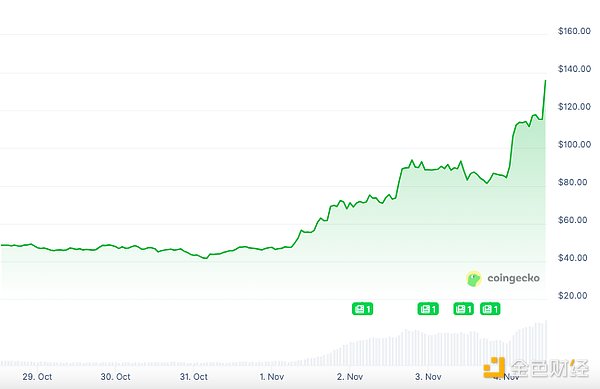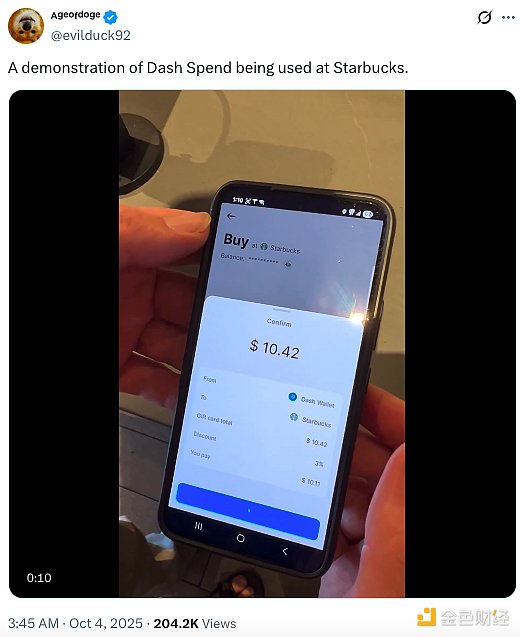Written by: 0xjs@ Jinse Finance
Dash has been performing exceptionally well recently.
Within 7 days, the price of DASH rose from $41 and remained unaffected even during the sharp drop on November 3. On November 4, DASH reached a high of nearly $140, more than three times its original price.

Why has Dash performed so well in terms of price recently?
Dash also released an article summarizing the reasons, stating that this was not achieved overnight, but rather the result of five major achievements over the past few years.
1. DashSpend
First, DashSpend was released.

DashSpend demonstration at Starbucks McCafé
This feature, which offers significant discounts, was previously a standalone app called DashDirect, but that app ceased operation several years ago. Now, users can use Dash directly in their wallets to make purchases at hundreds of thousands of merchants.
2. Bill payment issues
Secondly, the issue of bill payment was studied in depth.
Thanks to Spritz Finance, Zypto, and Swapin. It is estimated that 3 billion people worldwide could potentially use Dash to pay at least part of their bills.
“Project Three Billlion”: Dash is ready for global rollout.
Three billion people.
This is roughly how many people we can enable to live in a decentralized currency system.
Not tomorrow, not ten years from now. It's today.
First, let me briefly introduce the background.
Dash's killer app: Cryptocurrency consumption
Dash is one of the oldest cryptocurrencies. For over a decade, we have been dedicated to providing a decentralized digital currency that is private, instant, affordable, secure, and easy to use. It operates stably and reliably. During this time, we have continuously refined and improved our technology, fully preparing for true mass adoption. Now, that moment is approaching.
But fundamentally changing the world's reliance on fiat currencies and the banking system is no easy task. It requires a fundamental rebuilding of the global economic infrastructure, or in the meantime, establishing new connections with the old system. And we have already done that.
If you download the DashPay wallet, you can see for yourself how Dash makes paying for real-world goods and services easy and convenient, while also offering significant discounts.
Now that we've done that, we've finally secured the necessary start-up capital to tackle the most pressing issue: the bills.
The most difficult obstacle to overcome: bills
Over the years, we've seen a wide variety of goods and services used to exchange for cryptocurrency: pizzas, alpaca socks, VPNs, dubious items on the dark web, and more. We've also seen prepaid debit card and digital gift card providers act as intermediaries, helping people use cryptocurrency as currency.
Unfortunately, the most crucial aspect of living entirely in cryptocurrency—paying bills—is also one of the most complex. This is because bills are typically tied to personal identities and accounts (rather than anonymous goods or services that can be purchased with cash), meaning there's a need to interface with traditional financial services institutions, which have historically been hostile to cryptocurrencies.
For a long time, Dash users in many countries have been able to purchase a wide variety of goods for small purchases, but they still primarily rely on banks to pay for their largest and most important expenses. This means that for some, Dash is a novelty; for a very small number of users who can create personalized local peer-to-peer economies, it is the true digital currency; but for global users, it is far from a mainstream currency.
We are resolving the bill payment issue.
This challenge has changed significantly in recent years. Thanks to the growing demand for cryptocurrency as a currency and the efforts of innovative companies, many users worldwide are now able to pay all their bills with cryptocurrency: utilities, mortgages, rent, internet, phone bills, and more. These companies allow users to add current payers to their bills, pay with cryptocurrency, and have it paid on their behalf. Moreover, all these premium services accept Dash.
The most mature of these is Swapin, which allows Europeans using the euro to seamlessly pay their bills with Dash. Bitrefill covers El Salvador. Spritz extends this support to the United States. Zypto allows users in the United States, Mexico, Costa Rica, Honduras, Guatemala, Egypt, India, Pakistan, the Philippines, Malaysia, and many other countries and regions to pay their bills with Dash. It's worth noting that in some regions, including the United States, Dash has established redundancy mechanisms with multiple bill payment service providers, so even if one company fails, users have a backup plan.
It's worth noting that all of these services are non-custodial, meaning users don't bear the risk of having their funds held in custody and can make payments using a wallet they control.
3. Improve the secure payment function
Third, we are comprehensively improving the confidential payment function.
This is an original feature that Dash introduced in 2014, but we're making significant improvements to make it faster, more efficient, and more stable. We believe privacy will flourish in 2025!
Dash is undergoing a complete overhaul and simplification of its privacy features.
In June 2024, Dash DAO voted on a governance proposal to improve the confidentiality and security of user payments. The first step was to add support for Confidential Transactions (CT), which would bring a series of different optimizations.
background
Since its launch in 2014, Dash has been committed to continuing Bitcoin's original promise of permissionless digital cash use. One of the first improvements was the CoinJoin feature implemented at the protocol level. Enabling this feature effectively breaks down the transaction graph (the path between the sender and receiver), allowing users to trade with peace of mind without worrying about their private financial information being leaked to their trading partners.
Over the years, Dash's CoinJoin feature has been continuously optimized, and all dedicated wallets support this function. However, with technological advancements and evolving user needs, we are undertaking a major upgrade to make this feature more efficient, convenient, flexible, and easy to use.
A New Chapter: Confidential Transactions
Dash will add support for Confidential Transactions (CT) in the near future, following a DAO vote to move forward with the upgrade.
In short, CT hides transaction amounts and address balances. Therefore, while you can see the source and destination of a transaction, only the sender and receiver know the specific amount. If CT is adopted as the default standard by wallets, ordinary users can immediately and seamlessly conduct transactions without worrying about their funds or the amount spent on goods/services being leaked, while also maintaining transparent payment records on the blockchain for accounting purposes.
CT (Confidentiality Technology) is a well-proven encryption technology that forms the basis of many modern privacy solutions. Notably, it has recently been adopted by numerous leading projects in the non-explicit privacy field, including Solana, PayPal, and Circle. CT is rapidly becoming the standard for confidentiality, and even the most stringent regulatory bodies recognize it as a fundamental safeguard for secure transactions.
What can CT technology do?
Besides enhancing user privacy by hiding transaction amounts and balances, CT is also a first step towards many subsequent improvements. Specifically, it can significantly improve Dash's CoinJoin functionality.
By hiding the amount, CoinJoin's process can be significantly simplified. Currently, funds are split into different denominations, and each denomination is mixed 4 to 16 times. This makes transactions difficult to track and increases the time and complexity of the process. With CT, the amount is hidden, meaning you don't need to split your balance into dozens of denominations or perform multiple mixing processes. This allows the background mixing process to take only a few seconds instead of minutes, greatly reducing the likelihood that users will notice it.
Even if not all users mix different amounts of currency, hiding the amount removes an important data point for analytics. In the old system, if a user mixed a specific amount of currency and sent it to someone else, that amount might appear in future transaction records. If the future recipient wasn't careful to protect privacy, they could potentially link this transaction to existing records. But with transparent addresses, this data point disappears, meaning that even if future recipients aren't very privacy-conscious, the information available for analysis is significantly reduced.
In short, CT provides a robust default standard for all Dash users, helping them protect sensitive financial information, while unlocking new tools for users with advanced privacy needs.
expect
While CT is a first step toward significant improvements to Dash confidential payments, there are other relatively simple additional steps we can take to further enhance its effectiveness.
First, we can implement Sietch, a technology pioneered by Hush. In short, Sietch sends some extra zero-value outputs in each transaction, making each payment appear as a multi-party payment. This technology was originally designed to fill the last remaining loophole in zero-knowledge cryptocurrencies like Zcash. While implementing Sietch in a completely transparent blockchain makes no sense (anyone could see which outputs didn't actually send any tokens), in transparent transactions (CT), outputs containing tokens and those not containing tokens are indistinguishable. It's worth noting that Sietch can be implemented at the wallet level, not the protocol level, thus requiring no changes to the Dash codebase.
Wallets that integrate Sietch and CT by default offer Dash users good instant transaction privacy without requiring any interactive features like CoinJoin. However, when Sietch is used in conjunction with CT and CoinJoin, a very robust privacy solution is achieved: transaction amounts are hidden, the transaction graph is destroyed before and after the transaction, and multi-party and unilateral payments are indistinguishable. This provides Dash users with a powerful set of features to help them achieve their desired level of payment confidentiality while maintaining blockchain transparency and ensuring that the source and destination addresses of transactions are always traceable.
Another potential improvement is to enhance network-level privacy protections to prevent malicious nodes from eavesdropping on transactions. One such improvement is… the Hawkweed Protocol, which effectively makes it as difficult as possible for cyber spies to know which node created a given transaction.
Next steps
Our next priority is integrating CT support into the Dash protocol. Following that, we will add CT support to our own dedicated wallets and services, and further optimize CoinJoin to be CT-compatible. Finally, we will seek out as many third-party wallets and services as possible within the broader Dash ecosystem to deploy CT, thereby providing the best possible user experience.
A new era has arrived. Dash remains true to its original mission: to become the most efficient, convenient, and comprehensive secure digital cash. Join us and bring it to the masses.
4. DEX Integration
Dash has been added to the Maya Protocol. Maya is a powerful cross-chain AMM DEX that supports decentralized Dash trading globally. It is the first DEX platform to integrate Dash (and is therefore particularly special), but more features are coming soon.
5. Dash Evolution, smart contract functionality
Finally, and most importantly: Dash Evolution.
Dash has released its brand-new blockchain, Dash Evolution, at its core an advanced indexed database with proof functionality. This provides support for our username system, but its capabilities extend far beyond that.
Evolution is a platform for executing data contracts. These contracts write data to an indexed and queryable decentralized storage. Sidechains, running on the same nodes as the main chain, handle data transactions, while the network's decentralized API allows anyone to access this data on demand.
It is ideal for any application that needs to store data in a decentralized manner and can quickly search and access the data it needs. For example, accounting software, business maps, social media, etc., any application that needs to store data in a decentralized, censorship-resistant manner and can easily access the data it needs anytime, anywhere.
This is an ambitious project. It's not just about adding a new set of features to Dash, but about launching a completely new and radical blockchain network that will interface with the existing Dash network.
Dash's smart contract functionality will be available in 2026.







